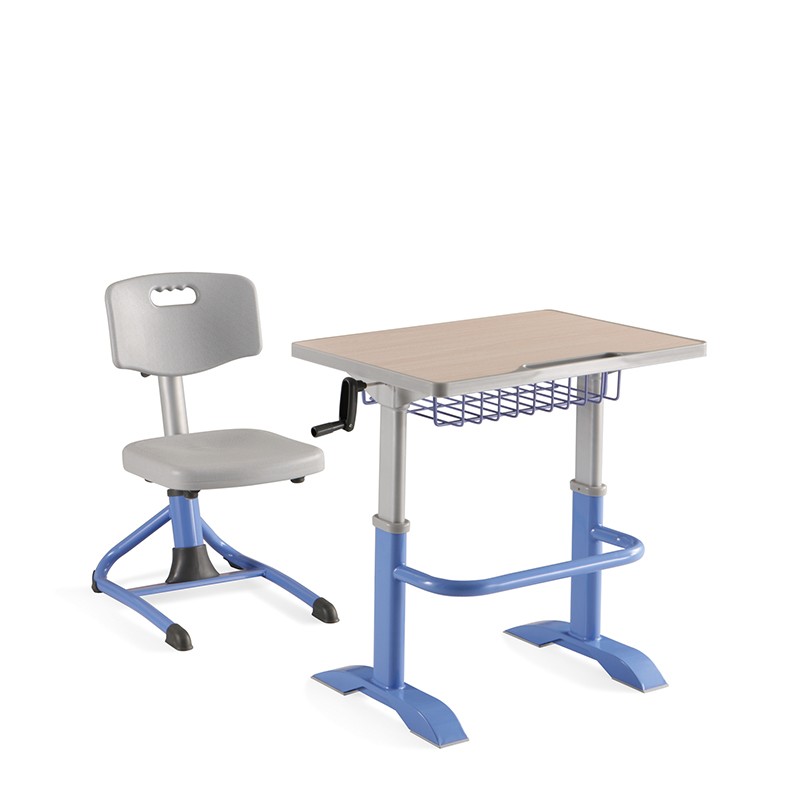How To Accurately Screen Suppliers Of Compliant Adjustable Desks?
1. Core changes of the new EN 1729-2024 regulations: triple upgrades in safety, adaptation and sustainability
The latest EN 1729-2024 standard released by the European Union replaces the old version of EN 1729-1/2, and puts forward more stringent requirements for the compliance of school furniture, focusing mainly on the following areas:
Ergonomic adaptation precision
Added a new height classification standard for students aged 6-18, requiring the height adjustment range of desks to be refined to 10 levels (the old rule was 5 levels) to ensure matching with the spinal development curves of different age groups;
Mandatory desktop tilt angle adjustment function to adapt to multiple scenarios such as writing, reading, and painting.
Enhanced safety performance
The structural stability test load is increased to 50kg vertical pressure + 20kg horizontal thrust;
All corners must pass the R10 rounded corner treatment certification to prevent collision damage;
The adjustment mechanism must pass 10,000 durability tests to eliminate the risk of loosening during use.
Sustainable production traceability
Suppliers are required to provide FSC/PEFC certification for wood and data on the proportion of metal parts that can be recycled;
Coatings and adhesives must comply with the EN 71-3 toy safety standard.

2. Five core indicators for selecting compliant suppliers
1. Certification qualifications: penetrating verification
Required: EN 1729-2024 full test report;
Bonus points: ISO 14001 environmental management system, GREENGUARD Gold indoor air quality certification.
2. Engineering design and production control capabilities
Structural verification: Suppliers are required to provide finite element analysis simulation reports to prove that the deformation of the desk under extreme load is less than 1mm;
Production line audit: Confirm that the factory has automated welding and CNC cutting equipment to avoid dimensional deviations caused by manual errors.
3. Localized services and rapid response
Prefer suppliers with warehousing or assembly centers in Europe to ensure emergency spare parts supply within 48 hours;
Require the provision of dynamic adaptation solutions: for example, pre-adjust the parameters of the desks in batches according to the male-female ratio and height distribution data of the school class to reduce the deployment cost of the school.
4. Cost transparency and long-term compliance commitment
Require suppliers to sign a "Dynamic Regulatory Guarantee Agreement" and promise to upgrade products to the new EU regulations for free in the next three years;
Compare total cost of ownership: choose desks with tool-free adjustment mechanisms and modular designs to reduce maintenance costs for a use cycle of more than 10 years.
5. In-depth understanding of educational scenarios
Priority cooperation cases cover suppliers of STEM classrooms and special education institutions
Verify whether the supplier participates in the Education Space Design Alliance to ensure that the product is compatible with future teaching models.
III. Pitfall avoidance guide: Characteristics of three types of high-risk suppliers
Fuzzy certification: only provide vague statements such as "complying with EN 1729 principles" and refuse to disclose complete test reports;
Low price trap: the quotation is more than 15% lower than the market average price, usually achieved by reducing the thickness of steel and using non-standard accessories;
No local technical support: relying on direct mail from Asia, unable to provide on-site installation training or quick after-sales response.
IV. AOYASI's EN 1729-2024 compliance solution
As an EN 1729 certified furniture supplier with 38 years of experience in educational furniture, AOYASI provides the following services based on the principle of "zero compliance risk":
Full-chain compliance guarantee: From the Danish design team, German testing laboratory to the Polish manufacturing base, the entire process is controlled in accordance with EN 1729-2024;
Intelligent adjustment system: The desks have built-in NFC chips, and teachers can synchronize class height data with a tablet with one click to automatically generate adjustment plans;
Green premium: using bio-based plastics and water-based UV coating (0 formaldehyde release), exceeding the EU environmental baseline.


